Dave Zachariah
Division of Systems and Control
Anytime-Valid Conformal Risk Control
Feb 04, 2026Abstract:Prediction sets provide a means of quantifying the uncertainty in predictive tasks. Using held out calibration data, conformal prediction and risk control can produce prediction sets that exhibit statistically valid error control in a computationally efficient manner. However, in the standard formulations, the error is only controlled on average over many possible calibration datasets of fixed size. In this paper, we extend the control to remain valid with high probability over a cumulatively growing calibration dataset at any time point. We derive such guarantees using quantile-based arguments and illustrate the applicability of the proposed framework to settings involving distribution shift. We further establish a matching lower bound and show that our guarantees are asymptotically tight. Finally, we demonstrate the practical performance of our methods through both simulations and real-world numerical examples.
Learning Treatment Allocations with Risk Control Under Partial Identifiability
May 13, 2025Abstract:Learning beneficial treatment allocations for a patient population is an important problem in precision medicine. Many treatments come with adverse side effects that are not commensurable with their potential benefits. Patients who do not receive benefits after such treatments are thereby subjected to unnecessary harm. This is a `treatment risk' that we aim to control when learning beneficial allocations. The constrained learning problem is challenged by the fact that the treatment risk is not in general identifiable using either randomized trial or observational data. We propose a certifiable learning method that controls the treatment risk with finite samples in the partially identified setting. The method is illustrated using both simulated and real data.
Target Tracking using Robust Sensor Motion Control
Feb 28, 2025Abstract:We consider the problem of tracking moving targets using mobile wireless sensors (of possibly different types). This is a joint estimation and control problem in which a tracking system must take into account both target and sensor dynamics. We make minimal assumptions about the target dynamics, namely only that their accelerations are bounded. We develop a control law that determines the sensor motion control signals so as to maximize target resolvability as the target dynamics evolve. The method is given a tractable formulation that is amenable to an efficient search method and is evaluated in a series of experiments involving both round-trip time based ranging and Doppler frequency shift measurements
Certified Inventory Control of Critical Resources
May 23, 2024Abstract:Inventory control is subject to service-level requirements, in which sufficient stock levels must be maintained despite an unknown demand. We propose a data-driven order policy that certifies any prescribed service level under minimal assumptions on the unknown demand process. The policy achieves this using any online learning method along with integral action. We further propose an inference method that is valid in finite samples. The properties and theoretical guarantees of the method are illustrated using both synthetic and real-world data.
Adaptive Parameter-Free Robust Learning using Latent Bernoulli Variables
Dec 01, 2023



Abstract:We present an efficient parameter-free approach for statistical learning from corrupted training sets. We identify corrupted and non-corrupted samples using latent Bernoulli variables, and therefore formulate the robust learning problem as maximization of the likelihood where latent variables are marginalized out. The resulting optimization problem is solved via variational inference using an efficient Expectation-Maximization based method. The proposed approach improves over the state-of-the-art by automatically inferring the corruption level and identifying outliers, while adding minimal computational overhead. We demonstrate our robust learning method on a wide variety of machine learning tasks including online learning and deep learning where it exhibits ability to adapt to different levels of noise and attain high prediction accuracy.
Externally Valid Policy Evaluation Combining Trial and Observational Data
Oct 23, 2023



Abstract:Randomized trials are widely considered as the gold standard for evaluating the effects of decision policies. Trial data is, however, drawn from a population which may differ from the intended target population and this raises a problem of external validity (aka. generalizability). In this paper we seek to use trial data to draw valid inferences about the outcome of a policy on the target population. Additional covariate data from the target population is used to model the sampling of individuals in the trial study. We develop a method that yields certifiably valid trial-based policy evaluations under any specified range of model miscalibrations. The method is nonparametric and the validity is assured even with finite samples. The certified policy evaluations are illustrated using both simulated and real data.
Regularization properties of adversarially-trained linear regression
Oct 16, 2023Abstract:State-of-the-art machine learning models can be vulnerable to very small input perturbations that are adversarially constructed. Adversarial training is an effective approach to defend against it. Formulated as a min-max problem, it searches for the best solution when the training data were corrupted by the worst-case attacks. Linear models are among the simple models where vulnerabilities can be observed and are the focus of our study. In this case, adversarial training leads to a convex optimization problem which can be formulated as the minimization of a finite sum. We provide a comparative analysis between the solution of adversarial training in linear regression and other regularization methods. Our main findings are that: (A) Adversarial training yields the minimum-norm interpolating solution in the overparameterized regime (more parameters than data), as long as the maximum disturbance radius is smaller than a threshold. And, conversely, the minimum-norm interpolator is the solution to adversarial training with a given radius. (B) Adversarial training can be equivalent to parameter shrinking methods (ridge regression and Lasso). This happens in the underparametrized region, for an appropriate choice of adversarial radius and zero-mean symmetrically distributed covariates. (C) For $\ell_\infty$-adversarial training -- as in square-root Lasso -- the choice of adversarial radius for optimal bounds does not depend on the additive noise variance. We confirm our theoretical findings with numerical examples.
Offline Policy Evaluation with Out-of-Sample Guarantees
Jan 20, 2023Abstract:We consider the problem of evaluating the performance of a decision policy using past observational data. The outcome of a policy is measured in terms of a loss or disutility (or negative reward) and the problem is to draw valid inferences about the out-of-sample loss of the specified policy when the past data is observed under a, possibly unknown, policy. Using a sample-splitting method, we show that it is possible to draw such inferences with finite-sample coverage guarantees that evaluate the entire loss distribution. Importantly, the method takes into account model misspecifications of the past policy -- including unmeasured confounding. The evaluation method can be used to certify the performance of a policy using observational data under an explicitly specified range of credible model assumptions.
Diagnostic Tool for Out-of-Sample Model Evaluation
Jun 22, 2022
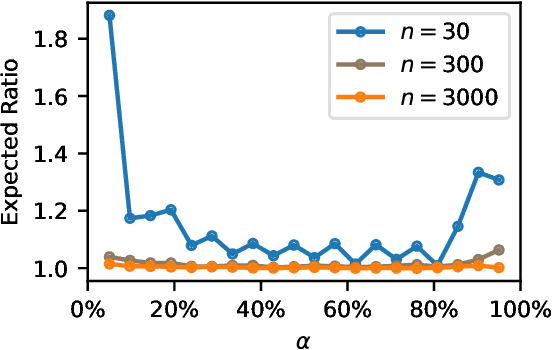
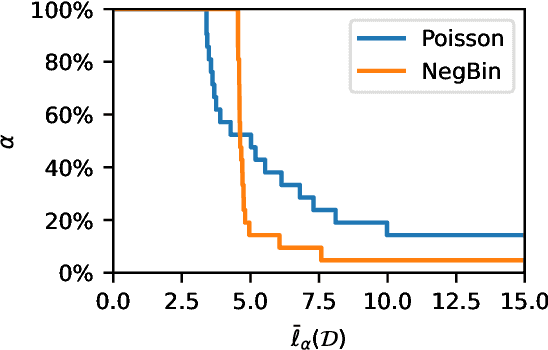
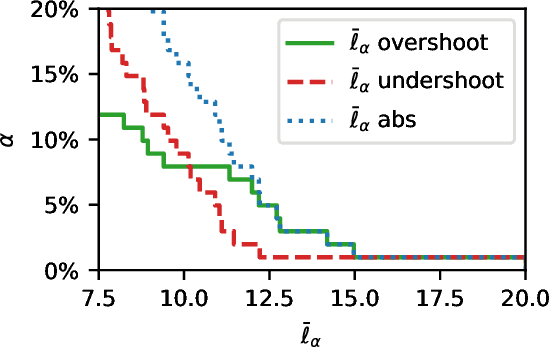
Abstract:Assessment of model fitness is an important step in many problems. Models are typically fitted to training data by minimizing a loss function, such as the squared-error or negative log-likelihood, and it is natural to desire low losses on future data. This letter considers the use of a test data set to characterize the out-of-sample losses of a model. We propose a simple model diagnostic tool that provides finite-sample guarantees under weak assumptions. The tool is computationally efficient and can be interpreted as an empirical quantile. Several numerical experiments are presented to show how the proposed method quantifies the impact of distribution shifts, aids the analysis of regression, and enables model selection as well as hyper-parameter tuning.
Surprises in adversarially-trained linear regression
May 25, 2022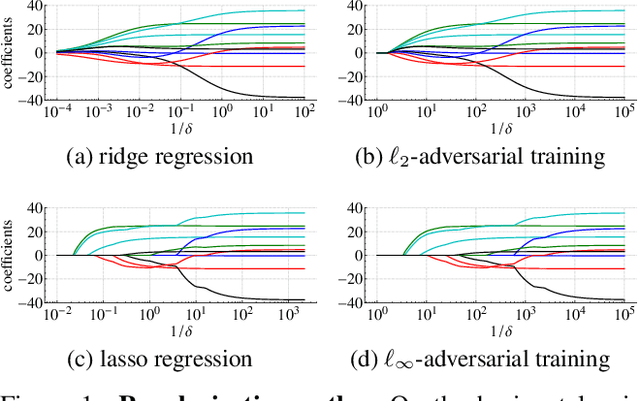
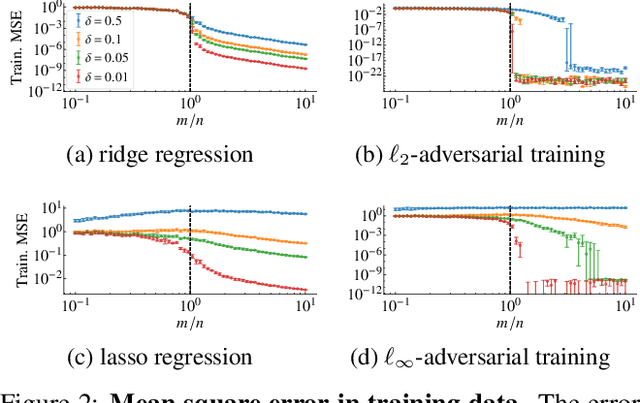
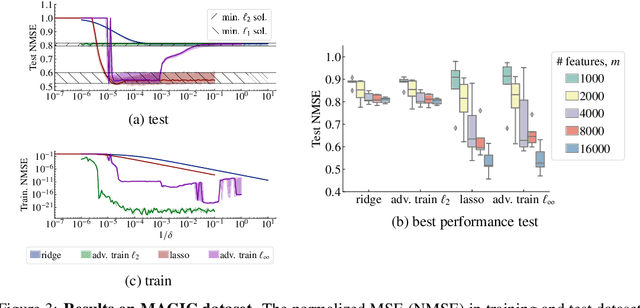
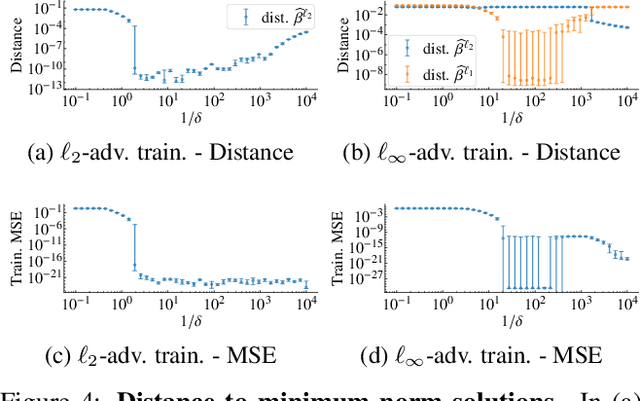
Abstract:State-of-the-art machine learning models can be vulnerable to very small input perturbations that are adversarially constructed. Adversarial training is one of the most effective approaches to defend against such examples. We show that for linear regression problems, adversarial training can be formulated as a convex problem. This fact is then used to show that $\ell_\infty$-adversarial training produces sparse solutions and has many similarities to the lasso method. Similarly, $\ell_2$-adversarial training has similarities with ridge regression. We use a robust regression framework to analyze and understand these similarities and also point to some differences. Finally, we show how adversarial training behaves differently from other regularization methods when estimating overparameterized models (i.e., models with more parameters than datapoints). It minimizes a sum of three terms which regularizes the solution, but unlike lasso and ridge regression, it can sharply transition into an interpolation mode. We show that for sufficiently many features or sufficiently small regularization parameters, the learned model perfectly interpolates the training data while still exhibiting good out-of-sample performance.
 Add to Chrome
Add to Chrome Add to Firefox
Add to Firefox Add to Edge
Add to Edge